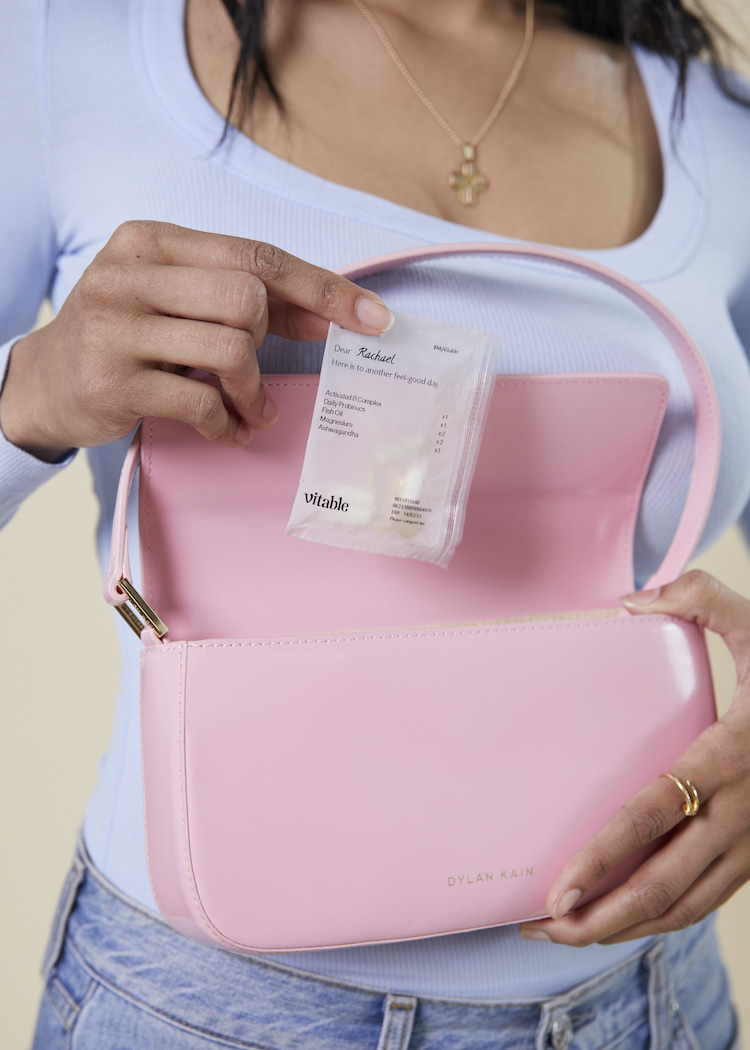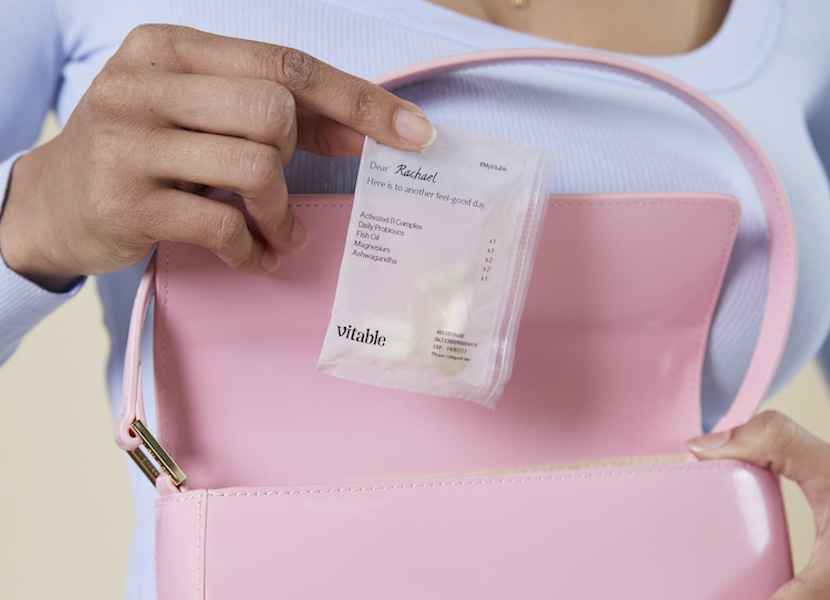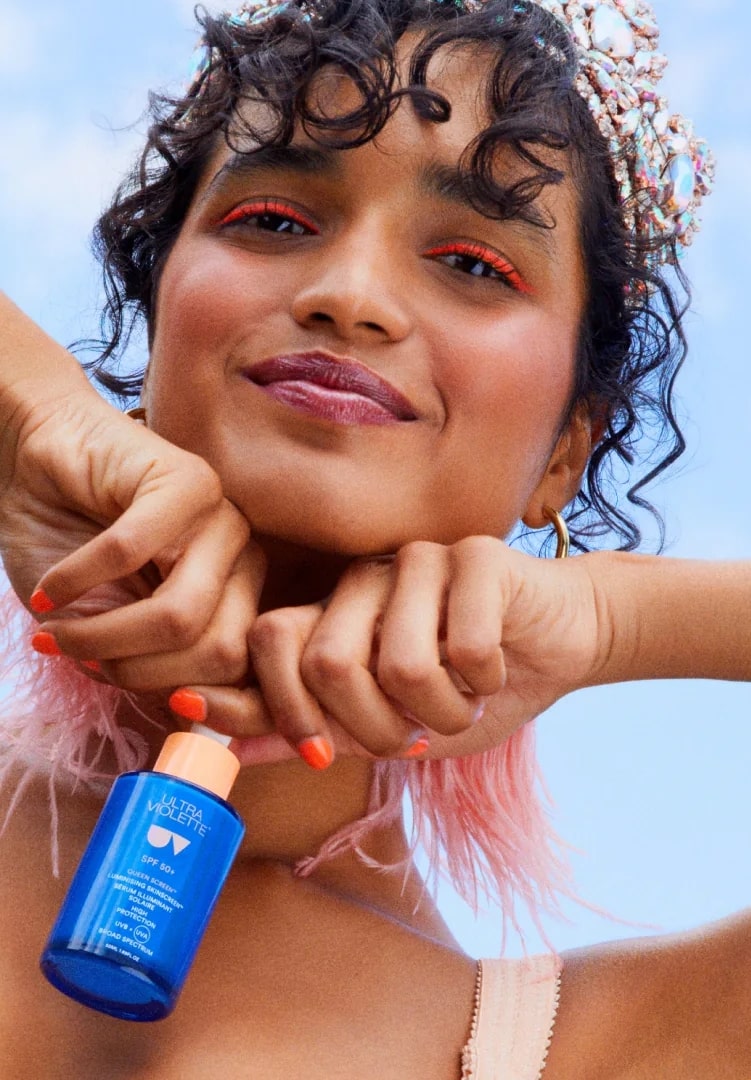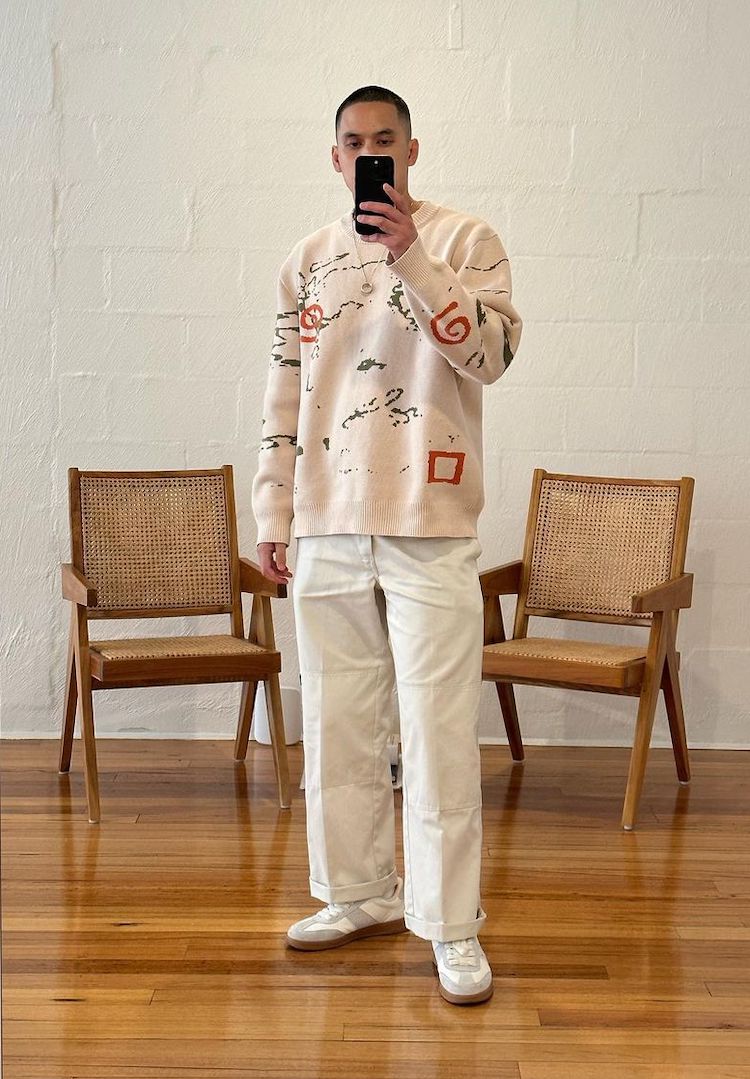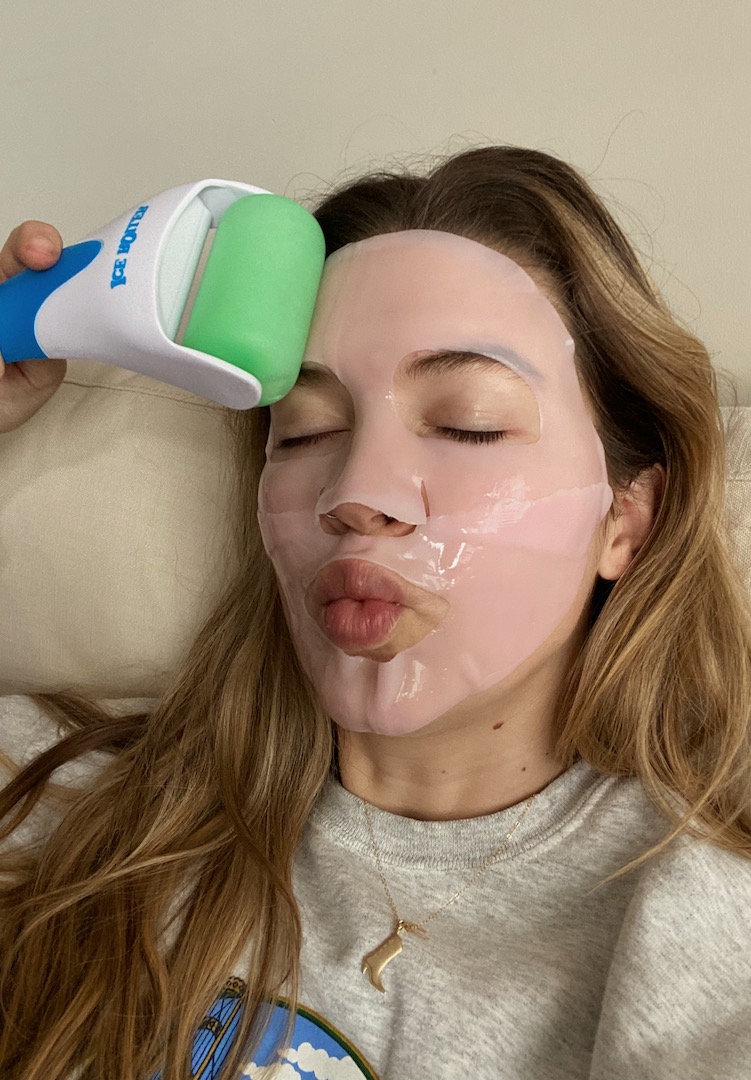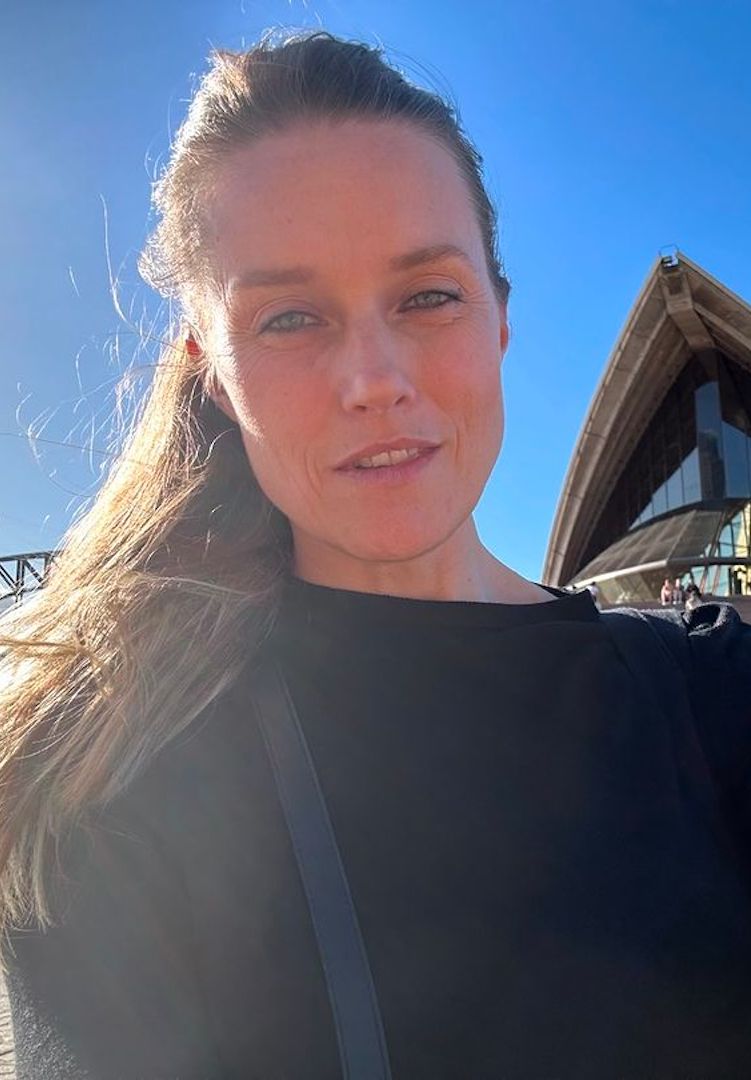Meet the Australian wellness company creating personalised vitamins for your daily use
“We chose to really break down the science in very simple terms.”
When it comes to choosing vitamins, it’s easy to feel overwhelmed when browsing shopping aisles or scanning your mum’s vitamin stash for something suitable. That’s partly why Larah Loutati created Vitable, a personalised vitamin subscription service that provides daily vitamins and supplements based on your unique goals.
Interested to hear how others navigate the world? Head to our Life section.
The brand takes the guesswork out of adding supplements to your routine. It’s as easy as taking its expert five-minute quiz and receiving your unique plan, created from 1.2 million possible vitamin combinations. Made with those of us who are time-poor or nutritionally unsavvy in mind, vitamin packs are delivered to your door each month in easy-to-take, plastic-free, home-compostable sachets.
Tell us about what inspired you to create Vitable.
I was working a very intense corporate job before I started Vitable. I was working quite hard and not necessarily having a good work-life balance and I just started to feel the early signs of burnout. I started having brain fog [and] afternoon energy slumps every day, and I was just not feeling good. Like a lot of people, I googled my symptoms and I was overwhelmed by the amount of conflicting information that I could find online. I went to the chemist and I found myself lost in the middle of thousands of similar bottles and I didn’t understand what products I should take and in what dose…

I was working with a nutritionist and naturopath at the time and they were the ones who started asking me very specific questions about my lifestyle [and] diet and explaining in very simple words how those could be impacting my nutrient levels. They started pinpointing what I could be improving, and they gave me a couple of very high-quality supplements that I started taking… in a few weeks, I started feeling good again. I had an epiphany and I realised that a lot of us are really time-poor, we don’t have a PhD in science and figuring it out is very hard. I wanted to bring the personalised and honest guidance that I had experienced and make it easily accessible and affordable.
What was your a-ha moment when you realised that personalised vitamins were better than a one-size-fits-all approach?
There are so many products out there on the market… [promoting] magic pills or over-promising claims that tell you that you’ll take it and then you’ll have very long hair or your energy levels will go up straight away. I think that it’s not setting a realistic expectation for customers as well. At Vitable, we have the belief that it’s important to have also a balanced lifestyle [and] diet and that vitamins and supplements are here to do what they say they will do, meaning supplementing your lifestyle and diet.
I think [there are] a lot of generic multivitamins out there [and] it’s almost a race to how many ingredients you can fit in a tablet or in a capsule but then the problem is that you might not get enough of the good stuff, and too much of what doesn’t matter in those multivitamins. I think what’s really important is to focus on what you really need and get a therapeutic dose of those active ingredients… one size fits all [approaches] aren’t good enough, and… you need a personalised approach to your health.

It can often take a while to get into the routine of taking vitamins daily. What tips would you give someone who’s trying to take their vitamins consistently?
We rely a lot on science and research, and a lot of research has shown that there is almost a framework to building and sticking to a routine. The first item is having a cue, so something that reminds you to take your vitamins daily. A cue can also be habit stacking, so coupling it [taking your vitamins] with something that you’re already doing on the daily. The second item is the actual habit, so it’s taking your vitamins.
The easier it [the cue] is then the easier it is to take [your vitamins] the next day. The third part is reward. In order to start building habits consistently, you need to either get a reward or create a reward for doing it. A really interesting reward could be you just thinking to yourself ‘I’m doing something good for my body’ once you’ve taken your vitamins. It’s reinforcing that you’re doing something good. Once you do these three things consistently your habit just becomes part of your life.
Aside from taking vitamins, what else do you do to feel good every day?
For me what’s really important is getting up and doing some sort of movement. Sometimes I’ll wake up [and] I don’t feel like going to the gym, I don’t feel like running, and maybe, I’m a little bit tired, but I will always at least go for a walk. That’s really something that helps with mental health and helps me start my day on the right foot. [On] other days I love going for a run and pushing a little bit harder and sweating it out.
Sustainability is moving closer to the forefront of people’s minds each year. How does Vitable practice social responsibility?
It’s very important and definitely part of our core values as a business. We don’t want to add to the waste and we’re trying to really move away from that as much as possible so what we’ve done is create certified home compostable material made from plant-based materials in order to pack all our vitamins and supplements. By doing that we’re able to reduce waste [and] reduce plastic as well and because they biodegrade over time, we’re able to return nutrients to the soil without releasing toxins.
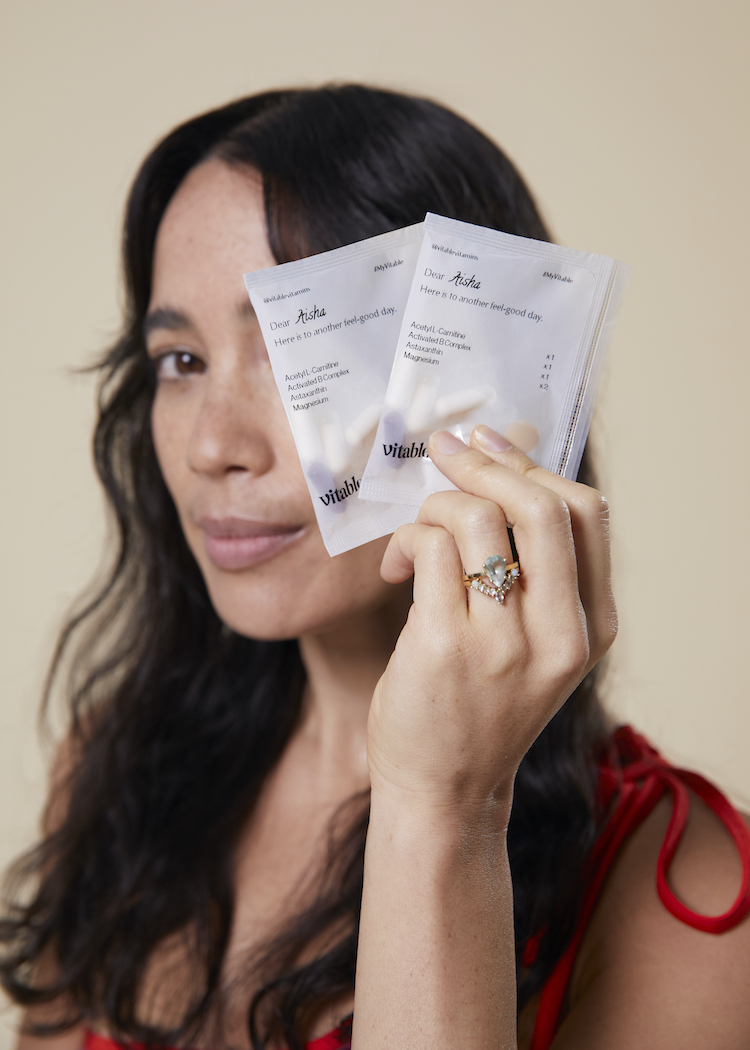
We also reduce waste every step of the way. We ship our recurring orders into much smaller packaging, which is FSC certified so [they’re] made from sustainable resource[s]. Our concept is we want to reduce plastic and we also want to reduce waste overall. The last step is we also offset our carbon emissions but I think the third step cannot come without one and two. We’ve partnered with a startup called Trace, which helps companies assess and reduce their carbon emissions by investing in a very specific project. For example, we’re really excited we invested in reforestation projects in Australia, but also in Madagascar, and that’s how we also want to contribute to the future of the planet.
The market is inundated with brands that take a ‘more is best’ approach when sharing information regarding their supplements. Why was it important for you to simplify your message?
We really believe in transparency in everything that we do. We really believe that the traditional market was kind of playing on the fact that there was confusion, that people don’t understand the scientific jargon and we believe that it’s definitely shifting. The new generation, millennials and Gen Z, really want to make decision[s] for themselves and they want to be empowered to make their own choice[s]. I think that can only happen through transparency and honesty from brands.
That’s why we chose to really break down the science in very simple terms and essentially let people decide if such and such supplement is good for them by providing them with easy-to-understand explanation[s] on why they may need it and what to look out for. We’re building a very engaged community of people who value our transparency and honesty.
What are your three desert island vitamins?
I would go with activated B complex. For me, it’s always a go-to vitamin. It’s a combination of B vitamins and B vitamins help, among other things, they help transform food into energy. I also love my zinc. Zinc is quite a well-known mineral and it’s very good for skin and immunity as well. My third one would probably be ashwagandha. Ashwagandha is an Ayurvedic herb, backed by extensive research. It’s an adaptogen that helps your body adapt to stress.
To find the right vitamins for your lifestyle, take the quiz here.
Always read the label. Follow the directions for use. If symptoms persist, change, or worsen, talk to your health professional. Vitamin and supplements should not replace a balanced diet.


